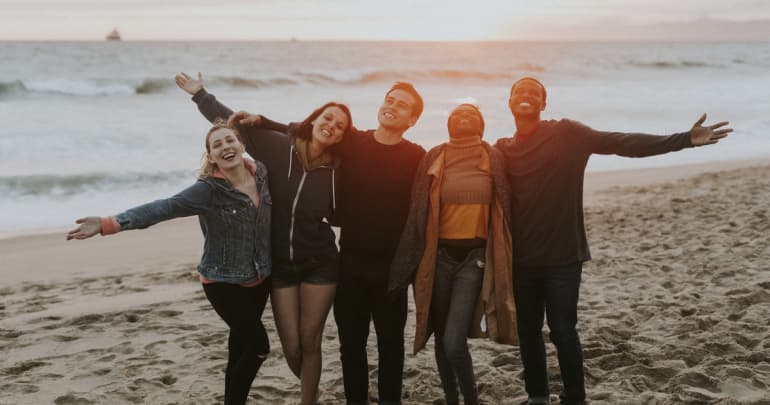Transformation is a crucial aspect of addiction recovery, but it is complex. Not only may an individual explore new hobbies and interests, but one may also need to revamp their social circle around their newfound sobriety after leaving a drug and alcohol inpatient treatment center.
However, creating a new social circle conducive to one’s new lifestyle is complicated, and navigating new social outlets and priorities can cause a plethora of newfound stresses in one’s journey. Finding and making new friends is essential as one prioritizes their hard-earned sobriety. There are many ways to develop one’s social skills and circle while maintaining abstinence from drugs and alcohol.
Creating Distance from Previous Friends
One may begin their sober journey with social circles intact. However, previous social groups are not necessarily outlets conducive to one’s newfound sobriety. Accepting that one may have to put distance between themselves and previous friends is crucial while creating a new approach to one’s social life.
Before entering recovery, one’s social circle may have been filled with individuals who do not understand the importance of a sober lifestyle, aren’t aware of the negative effects of addictive substances, or have actively encouraged the use of drugs or alcohol in the past. Likewise, activities with old friends may be closely tied to the use of addictive substances, such as poker groups that gather to drink and play cards regularly. These connections and connotations may not reflect the goals of one’s sober journey.
Distancing oneself from previous friends can be tricky, as severing these connections may leave an individual feeling like they are alone or isolated in their journey. However, if one’s previous friend groups purport to influence one’s sobriety negatively, it may be necessary to prioritize one’s sober identity.
However, talking to previous friend groups about one’s intentions — such as creating new, sober traditions — can create a healthy approach to sobriety alongside established friends. While some may be willing to jump into new, sober experiences, it is also possible that these friends may be unwilling to compromise established traditions, addictive substances included. While unfortunate, severing these connections is essential for one’s continued sobriety.

When you are looking for substance abuse and addiction treatment for you or a loved one, there are numerous options you can pursue.
More infoCreating a New Social Group
There are numerous ways to create a new social group that can support an individual’s sober convictions. For some, this can begin by redefining one’s relationships with previous family and friends.
Those willing to deviate from established practices and support one’s sobriety can be instrumental in creating new sober practices. Lifelong friends who are supportive about one’s new lifestyle make the best supports for one’s continued sobriety, bringing new traditions, group activities, and explorations into new hobbies and experiences instrumental in developing one’s new identity.
The Power of Volunteering
Not all friends and family units will be willing to sacrifice traditions in order to prioritize one’s sobriety, and pursuing new outlets may be essential. While there are many options available, volunteering in one’s local community can be the most impactful.
Not only does the act of volunteering allow an individual to support others while refining their own sense of responsibility, interpersonal skills, and acts of service, but it also allows an individual to ingratiate themselves in a community based on their present skills and goals rather than past mistakes. The ability to “start over” through a volunteering program and incorporate oneself as a charitable member of the community can be the catalyst of change that exemplifies one’s progress on their sober journey.

Social anxiety can jeopardize your recovery. Discover healing for addiction and mental health with Hawaii Island Recovery. Call (866) 390-5070 today.
More infoPursuing Your Own Hobbies
Finding one’s own interests and hobbies is essential in creating the best approach to finding new social outlets. Determining one’s hobbies and interests, such as art, cinema, video games, tabletop games, sports, and more, can all inform one’s decision to find new social outlets.
Pursuing one’s hobbies is crucial for one’s sober identity. Finding a local or online community focused on these hobbies allows individuals to incorporate themselves based on their skills or knowledge within the community rather than any unfair assumptions based on their past use.
Finding local game nights, attending community theater, and pursuing personal hobbies can indicate one’s new sober goals. Additionally, pairing one’s personally established interests with online groups on Instagram or other focused hobby sites can create a new community that champions one’s present self.
Finding Online Communities
The advent of online communities has changed the landscape of social interaction, and the world of addiction recovery is no different. Online communities exist entirely as a resource to connect sober individuals. Apps like SoberGrid are social media sites dedicated to connecting like-minded, sober individuals, while sites like Reddit create focused, specialized online message groups.
Making new friends in sobriety is crucial to your continued success. At Hawaii Island Recovery, we understand the need to create new, inviting, and supportive social connections to maintain your sober goals. Your time at our Hawaii recovery center — navigating detox, residential, and outpatient care — is backed by several unique and personalized therapeutic strategies geared to help you better understand your own sober identity while connecting you with like-minded peers and professionals to begin creating your new, sober social circle. Individual and group therapy, alongside a myriad of personalized techniques from meditation, yoga, EMDR, and spiritual and nature-focused strategies, all are available to help you take the first step into a new, healing-focused community. With us, you will have a safe space to explore your own identity and practice essential social skills, guiding you towards your own best practices. For more information on how we can help you, call us today at (866) 390-5070.
Get Help Today!
If you or a loved one need help, call Hawaii Island Recovery toll-free right now.
866-390-5070 Hawaii Island Recovery
Hawaii Island Recovery 










